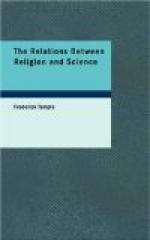What has been said of Science may be said also of Religion. Religion also has had its development, and in some respects a development parallel to that of Science.
It is possible to trace the steps by which men have obtained an ever larger and fuller knowledge of the Supreme Law of Right, a clearer perception of its application, of its logical results, of its relation to life, to conduct, to belief. It has grown through mistakes as Science has. There has been false Religion, as there has been false Science. Unsound principles of conduct have been inculcated in Religion as unsound generalisations have been set up in Science. There have been improper objects of reverence in Religion, as there have been impossible aims proposed for scientific investigation. Ezekiel rises above the doctrine that the children are punished for the sins of their parents, just as Galileo rises above the doctrine that nature abhors a vacuum. The parallel is all the more complete in that in many cases false religions have been also false sciences. The prayer to the fetish for rain is as contrary to true religion as it is contrary to true science. Many false religions are most easily overthrown by scientific instruction. Many false sciences begin to totter when the believers in them are taught true religion. The ordinary superstitions which have so strong a hold on weak characters and uninstructed minds, are as inconsistent with true faith in God as with reasonable knowledge of nature. Science grows, but the facts, whether laws or instances of the operations of those laws, are not affected by that growth. And Religion grows, but the facts of which it takes cognisance are not affected by that growth. Neither in the one case nor in the other is the fact that there has been a development any argument to show that the belief thus developed has no real foundation. The pure subjectivity of Religion, to use technical language, is no more proved by this argument than the pure subjectivity of Science.
But there is one most important particular in which the development of Religion entirely differs from the development of Science. The leaders of scientific thought, from the time that Science has been conscious of itself, have never claimed direct divine instruction. For a long time, indeed, scientific thought rested largely on tradition, and that tradition was handed on from generation to generation without any examination into its foundations. The stores of past observations seemed so very much larger in quantity than any that men could add in their own day, that it was natural to give more weight to what was received than to what was newly observed. The experience of each generation in succession seemed nothing in comparison with the accumulated experience of all preceding generations. And in many cases old traditions stopped the growth of Science by preventing the acceptance of observations inconsistent with them. But such old traditions never claimed to rest on a revelation from God; or, if such a claim was made here and there, it never had strength enough to root itself in Science and form part of the recognised authority on which Science stood.




